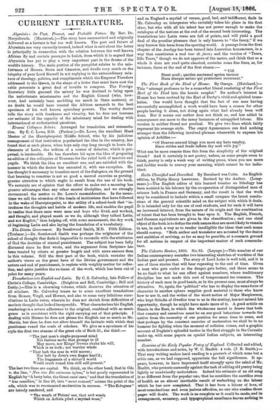- Translations into English and Latin. By C. S. Calverley,
late Fellow of Christ's. College, Cambridge. (Deighton and Bell, Cambridge ; Bell and Daddy.)—This is a charming volume, which deserves the attention of all scholars. Mr. Calverley treats us to some excellent translations from Homer, Virgil, and Horace, and also to some very felicitous fixer- citations in Latin verse, wherein he does not shrink from difficulties of modern thought that looked insuperable. What characterizes his English renderings is a severe adherence to the original, combined with as much grace as is consistent with the rigid carrying out of that principle. I dealing-with Horace he does not please the English ear so much as Mr. Martin, but then he does not allowhimself the latitude with which that gentleman vexed the souls of scholars. We give as a specimen of his style-the first two stanzas of the great ode of Book,iii., the third :—
" The just man's single-purposed mind Not furious mobs that prompt to ill May move, nor Kings' frowns shake his will, Which is as rock ; not warrior winds "That lash the seas in wild unrest ; Nor bolt by Jove's own finger hurl'd ; The fragments of a shiverd world Would crash round him still self-possest."
The last two lines are capital. We think, on the other hand, that in Ode v. the line, "Non sine Dis animosus infans," is but poorly represented in English by "A lusty babe, the Great-ones' care," and that the translation of " krze consiliwn," in line 40, into "sweet counsel," misses the point of the ode, which was to recommend-moderation in success. "The Eclogues" are tersely rendered, and
'" The wrath Of Peleus' son, that evil youth Which on Aohaia piled a myriad woes,"
and on England a myriad of verses, good, bad, and indifferent, finds in Mr. Calverley an interpreter who certainly takes his place in the first class, but who with all his talent has not power eneugh to make the catalogue of the nations at the end of the second book interesting. The translations into Latin verse are full of points, and will yield a good deal of the peculiar pleasure that is only known to "the fancy," if we may borrow this term from the sportingworld. A passage from the first chapter of the Analogy has been turned into Lucretian hexameters, in a way that constitutes a real tour de force; and the version of " Tears, Idle Tears," though we do not approve of the metre, and think'that as a whole it does not read quite classical, contains some fine lines, as, for instance, those at the end of the first stanza :-
" Udi Stant mull; quoties auctumni aprica tuemur Rura diesque animo qni praiteriere reeursant."






























 Previous page
Previous page